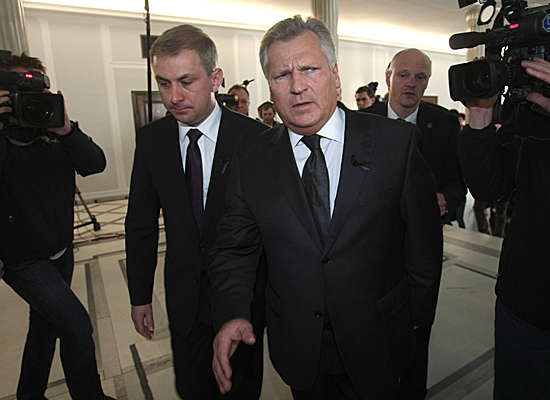 |
| Grzegorz Napieralski (Left) and Aleksander Kwaśniewski (Right). Photo © PAP / Leszek Szymański |
He goes through the Left's brief romance with the radical "Political Critique" youth movement, the fightback from the old guard and the current position that the SLD finds itself in: that of being a slightly more humanitarian alternative to the ruling center-right Civic Platform (PO) - in other words, Capitalism with a human face.
The Alliance has wasted more than half a decade only now to realize in the last few months that it does not want to be the principled left, but rather a better Civic Platform. An intellectually discrete, post-ideological, liberal organization. [...] They need leftism in homeopathic portions, just enough to differentiate themselves from the opposition.Krasowski, of course, views this as a good thing. He's echoing an old story that we've heard before about parties on the left and the right. Call it the "wilderness" theory - that whenever a party pulls away from the center there is a rupture between the radicals and centrists, leading self-destructive infighting and lost elections, until the party comes to its senses and returns to the moderate center and so starts winning elections again.
Not until being on the verge of a general election campaign, when the campaign strategy should have been ready long ago, has the left has that it does not want to go into power as the left, but as an organization of professionals, as a party of power.
But are we not really looking at a post hoc ergo propter hoc rationalization of the Neoliberal ideological narrative? Can one plausibly say, for example, that the kind of infighting that tore the Labour party apart as it radicalized in the 90s was not comparable to the infighting as it moderated during the Blair years? As Polly Toynbee is fond of pointing out, during the Blair years, in spite of winning 3 elections, Labour also lost 5 million voters. Is it then not equally plausible to say that the electoral success of Neoliberal politicians stems not from the genuine popularity of their ideas, but rather from the alignment of powerful interests behind them - in Blair's case, the City and its public-relations wing, the Murdoch press?
My point here is not to say that this second narrative is correct. My point is to demonstrate that it is narrative we are dealing with: the "wilderness" theory is not a rational, scientific conclusion drawn from an examination of historical facts, it (like the second narrative) is an ideological construction. But this is Neoliberalism's game: it presents itself as a scientific, pragmatic truth, devoid of ideology. But this masks what it really is - an ideological justification for the political settlement of Late Capitalism.
No comments:
Post a Comment